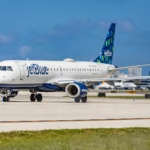United Airlines has recently announced the cancellation of 29 routes by their regional partner SkyWest Airlines, headquartered in Utah. These cancellations are due to a shortage of pilots.
Details behind the cancellation
SkyWest Airlines informed the U.S Department of Transportation that the routes will be cancelled indefinitely.
In a press release, the airline referred to “an ongoing pilot staffing imbalance across the industry” as what is to blame for the discontinuation of 29 services. The services are due to be suspended at the “beginning [of] this summer.”

One of the 29 routes to be terminated includes one to Shenandoah Valley Airport, which covers Essential Air Service (EAS) programme contracts.
EAS is a federal government programme that allows certified air carriers to serve communities at a cheaper subsidised price that otherwise would not be served. Because of this, SkyWest Airlines may be forced to continue those services affected by the EAS, especially if a replacement is not found.
United Airlines, as of yesterday, decided to discontinue flights between Charlottesville and Chicago’s O’Hare International Airport (CHO) from this summer.
CHO Deputy Executive Director Jason Burch spoke of the airline’s desire to revive demand for Chicago flights in the future but spoke of challenges such as COVID recovery and the pilot shortage as obstacles that can very much get in the way. Regardless, they are looking to “put together a strong case” to bring the Chicago service back.
This is unlikely, however, especially after United discontinued the 29 SkyWest routes.
The growing issue of pilot shortages
SkyWest CEO Chip Childs spoke in February of the intensity of demand post-COVID and how it has resulted in a much higher demand for experienced SkyWest pilots – particularly captains:
“This demand has created an imbalance of pilots here and across the regional industry […] pilot attrition was anticipated and planned for in our models and strategies. However, the rapid increase in captain attrition was not.”
Childs continued, stating that the incoming pipeline for new pilots currently training is strong, but the timing “creates an imbalance and production constraint for the next year or so.”
Pilot shortages have become a significant headache for the aviation industry globally.
As of now, it has been predicted that there will be a shortage of 34,000 commercial pilots – which makes up 10% of the overall workforce – by 2025 if global demand continues to recover post-pandemic and reach above 2019 levels of demand.
Airlines across the globe are reacting in different ways. U.S airliner Breeze Airways announced on Sunday that it is partnering with ATP Flight School to offer a streamlined route for graduates to become pilots with the carrier.
SkyWest Airlines is almost certainly not the only regional airline that will be forced to make changes and cuts in response to pilot shortages.









